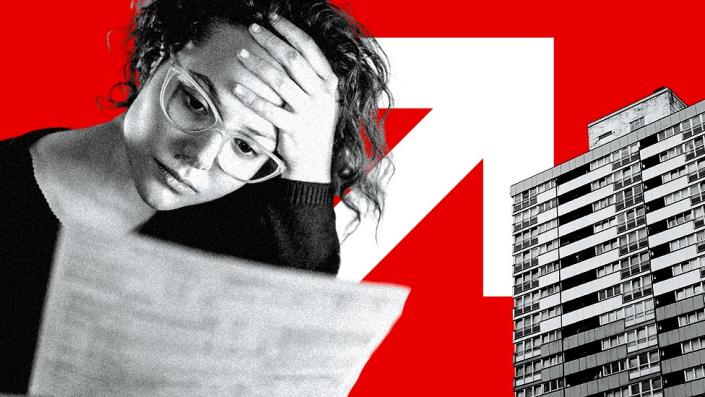
The average interest rate charged by mortgage lenders is now much higher than many homeowners have been used to.
So what can those struggling to make repayments do – and how must their mortgage providers help out?
How have tracker, variable and fixed mortgages changed?
There are different types of mortgages – all of which have become more costly in recent months.
Tracker rates rise and fall in line with the benchmark interest rate the Bank of England sets eight times a year
Standard variable rates (SVR) change at the discretion of the lender – a decision influenced by the Bank of England’s rate but not directly linked
Fixed rates, used by about three-quarters of mortgage customers, are set for a certain number of years – usually two or five – after which borrowers remortgage, or are automatically moved to an SVR
Mortgage rates have risen and the 1.6 million people on tracker or variable deals are paying far more than a year ago.
Around 1.5 million homeowners coming to the end of a fixed deal this year face moving to a much higher monthly bill.
What’s next for mortgage rates?
That is difficult to answer. The last year has been one of considerable increase in the sector, after many years of ultra-low rates.
The interest charged on fixed rates for new borrowers peaked after last autumn’s mini-budget, then somewhat calmed down, but has risen again during the early summer.

That’s because wages and prices look like they are rising faster and longer than thought, and so the Bank of England could keep the base rate up to 5.5% or more. It is currently 4.5%.
If the base rate does rise again, anyone on the tracker deals will face higher repayments.
House prices have also started to fall as higher interest rates put off buyers.
The government’s official forecaster, the Office for Budget Responsibility, suggested that UK house prices will fall by 10% by 2024 compared to last year’s peak.
Will mortgages be difficult to secure?
There are still plenty of options depending on your circumstances. However, it is more a question of whether people can afford higher repayments.
An agreement between lenders, the Treasury and regulators means people can switch to a new fixed-rate mortgage, without a new affordability test, when their current deal ends, as long as they are up to date with payments.
Click here to see the BBC interactive
Are there options when renewing my mortgage?
There are plenty of ways to try to keep mortgage repayments down when it comes to signing up for the next fixed-rate deal.
That might include using savings to pay down some of the total amount borrowed. Savings could also be put into a linked offset savings account, in which you only pay interest on the mortgage amount, minus the amount you’ve saved.
Some borrowers want to extend the length of the mortgage term, although that would mean paying more in total, for longer.
A broker can guide you through the different options.
What happens if I miss a mortgage payment?
A shortfall equivalent to two or more months’ repayments means you are officially in arrears.
But your lender must make reasonable attempts to reach an agreement with you.
In fact, the Financial Conduct Authority (FCA), which regulates mortgage lenders, has said they must treat customers fairly.
Crucially, customers must contact their lender as soon as they realize they are going to struggle to make repayments – the earlier the better. Trained and experienced staff must be on hand to help.
What must my lender do initially?
Within 15 working days of falling into arrears, your lender must:
Your lender must then treat you fairly by considering any requests about changing how you pay, perhaps with lower repayments for a short period.
Any arrangement you come to, the FCA points out, will be reflected in your credit file – affecting your ability to borrow money in the future – as will any missed payments.
Your lender might also suggest or allow you to extend the terms of the mortgage or let you pay just the interest for a certain period of time.
Can I take a mortgage holiday?
A mortgage payment holiday enables customers to delay repayments – but not indefinitely.
Lenders may offer this option, depending on individual circumstances – and not to those already in arrears – but the level of support offered during the Covid pandemic has been reduced.
Again, this will show on your credit file.
Could I lose my home?
Some people may decide to sell their home and – in extreme circumstances – the lenders could take court action to repossess it.
Repossessions are far rarer than they used to be.
There are many stages before a lender can take such action and the whole process takes about two years.
But if you think your home is at risk, it’s well worth getting free, independent debt advice.
What support does the government offer?
Governments tend not to get directly involved in support when people face higher mortgage repayments.
For people on qualifying benefits, Support for Mortgage Interests is available across the UK. The government pays some of your mortgage interest payments, but only in the form of a loan (which has its own interest rate).
Borrowers tend to pay off the loan when they sell the property, or when they die.
There are various conditions and requirements that need to be considered before signing up.
The devolved governments run several mortgage support schemes, but the criteria can be complex and they tend to be when people are at risk of homelessness. Here is a guide from the government-backed Moneyhelper website.
